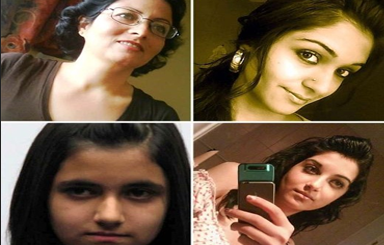Father Who Dismembered His 30-Year-Old Daughter Released from Tabriz Central Prison After 8 Months
Rezvan Moghaddam
In December 2023, a man from Tabriz committed a horrific crime by killing his daughter,
Mahsa, and dismembering her body in the bathroom of their home. He placed the body
parts in five trash bags and buried them in the surrounding desert. Mahsa’s brother,
Mehdi, reported her disappearance to the Tabriz police and sought help from detectives
to find her.
Mehdi informed the police about Mahsa’s disappearance, saying, “Due to my job, I
travel to other cities and usually return home after three days. This time, when I left,
Mahsa was at home, but when I came back, she was gone. I asked my father about her,
but he gave conflicting answers.” Based on Mehdi’s statements, the police interrogated
Mahsa’s father, who quickly confessed to the murder. He said:
“When my wife passed away, Mahsa constantly asked me to give her one of the houses
so she could live independently. I strongly opposed this because I didn’t believe it was
appropriate for a young, 30-year-old woman to live alone away from her family.
Mahsa, frustrated with my refusal, deliberately provoked me by exploiting my masculine
pride. She would frequently dress up heavily and leave the house at 11 or 12 at night.
On the night of the incident, around 12:30 a.m., Mahsa tried to leave the house again,
heavily made-up.
I tried to stop her by covering her mouth to prevent her from breathing. She struggled to
breathe and save herself, but I was so angry that I ignored her and kept my hand over
her mouth until she stopped breathing and turned blue.”
He also confessed to dismembering Mahsa’s body in the bathroom and placing the
parts in five trash bags. With the help of a friend named Mohammad, he transported the
dismembered body to the outskirts of Tabriz and buried it in the desert.
Although Mahsa’s father was arrested, he was released from prison in less than eight
months. This is not the first time the punishment for a killer is less severe than the
penalty for not adhering to compulsory hijab rules.
We recall that in February 2024, a father in Tabriz killed his 17-year-old son, Parsa, due
to his feminine appearance and behavior. He was sentenced to three years in prison by
the head of the 117th branch of the Tabriz Criminal Court II. The ruling stated:
“Considering that the victim is the defendant’s child; according to Article 612 of the Fifth
Book of the Islamic Penal Code, approved in 1996, and Articles 2 and 11 of the Law on
Reduction of Imprisonment Sentences, approved in 2020, the defendant is sentenced to
three years of imprisonment, accounting for the previous detention period.”
The laws of the Islamic Republic are one of the significant factors in the increase of
“honor killings,” which are often referred to as “family killings” by government-affiliated
media to avoid criticism of misogynistic laws. Below are some laws that encourage
“honor killings”:
- Article 630 of the Fifth Book of the Islamic Penal Code: “If a man finds his wife
committing adultery with another man and knows that the woman was a willing
participant, he can kill both of them at that moment. If the woman was coerced, only the
man can be killed. The same applies to beating and injury.” - Article 301 of the Islamic Penal Code: “Qesas (retaliation) is established if the
perpetrator is not the father or paternal grandfather of the victim.” This means that if a
father or paternal grandfather kills their child or grandchild, they are exempt from Qesas
but not from discretionary punishment. However, this exemption does not apply to
mothers, maternal grandmothers, or maternal grandfathers, who are subject to Qesas if
they kill their child or grandchild. - Article 612 of the Islamic Penal Code: “Anyone who commits premeditated murder and
does not have a private complainant, or if the complainant forgives the Qesas or for any
reason Qesas is not carried out, shall be sentenced to three to ten years of
imprisonment.”
Stop honor Killings Campaign

















